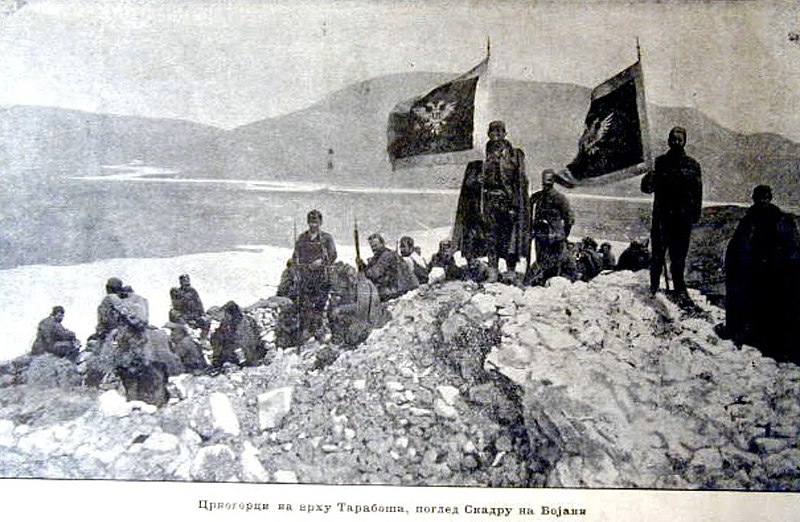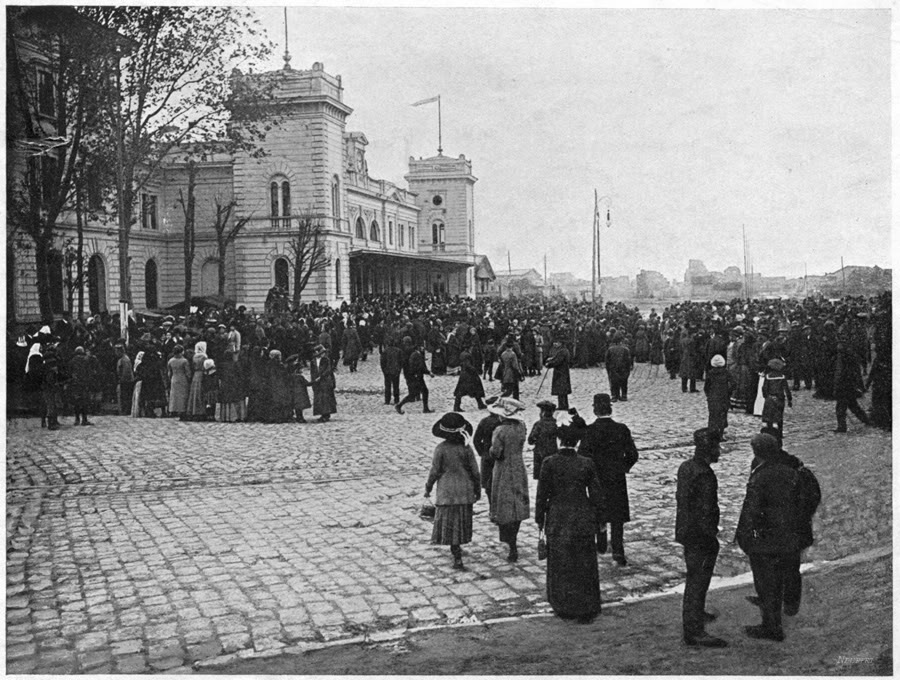The First Balkan War is one of the key events at the beginning of the 20th century in the history of the Balkan nations. In this war, a coalition of Balkan states, comprised of Serbia, Bulgaria, Greece, and Montenegro, defeated the Ottoman Empire. This victory marked the end of the dominant role of the Ottoman Empire in the Balkans and led to significant territorial changes in favor of the members of the Balkan League. However, despite initial unity and a shared goal, internal tensions among the allies quickly surfaced, laying the groundwork for the Second Balkan War and further changes in regional dynamics.
1. Description of the Balkans:
The Balkans, often referred to as the Balkan Peninsula, is a region in Southeast Europe renowned for its rich history and cultural diversity. Bounded by the Adriatic, Aegean, Black, and Ionian seas, it is geographically distinct and historically significant. The peninsula is characterized by its mountainous terrain, which has made it both a crossroads and a frontier for numerous civilizations throughout history.

The history of the Balkans is a tapestry of ancient empires, migrations, and the interplay of diverse religions and cultures. Among the most influential occupiers were the Ottomans, who seized a large portion of the Balkans in the 14th century and held sway for several centuries. Their rule introduced Islam to a region already steeped in Christian Orthodoxy and Catholicism, further enriching the religious mosaic of the area. This blend of traditions, religions, and histories makes the Balkans a unique and fascinating region in the European context.
2. Formation of the Balkan League:
As the Ottoman Empire began to show signs of decline in the late 19th and early 20th centuries, the Balkan nations sensed an opportunity to reclaim territories that were historically theirs. This common objective served as a catalyst for unlikely alliances in a region often divided by nationalistic fervor.
In 1912, a historic pact materialized: the Balkan League. This coalition, comprised of Serbia, Montenegro, Greece, and Bulgaria, was formed with the primary objective of ousting the Ottomans from Europe and redistributing the territories among themselves. The creation of the League was a significant diplomatic maneuver, given the historical tensions and disputes between its member states. Driven by the mutual goal of weakening the Ottoman grip, these nations temporarily set aside their differences. However, this alliance, marked by both ambition and compromise, also contained the seeds of its own dissolution. The overlapping territorial claims and differing national interests foreshadowed the complexities and conflicts that would emerge once the common enemy was defeated.
3. Major Battles of the First Balkan War:
The First Balkan War saw a series of decisive engagements that ultimately altered the balance of power in Southeast Europe. These battles showcased not only the military prowess of the Balkan League but also the weakening grip of the Ottoman Empire over its European territories.

One of the most significant battles was the Siege of Adrianople (Edirne). Historically an important city for the Ottomans, its loss in March 1913 was a huge blow to the empire. The combined forces of Bulgaria and Serbia laid siege to the city, and after months of intense fighting, the Ottomans were forced to surrender.
The Battle of Kirk Kilisse (Lozengrad) was another testament to the strength of the Balkan League. In October 1912, Bulgarian forces achieved a resounding victory against the Ottomans, pushing them back and paving the way for further advances into Thrace.
The Battle of Monastir (Bitola) in November 1912 highlighted the capabilities of the Serbian army. Serbian forces managed to liberate this key city from the Ottomans, ensuring a strategic advantage in the region.
Lastly, the Battle of Lemnos showcased the naval power of the Greeks. In this engagement, the Greek navy triumphed over the Ottoman fleet, securing control over the Aegean Sea.

Each of these battles not only marked territorial gains for the Balkan League but also symbolized the decline of the once-mighty Ottoman Empire in Europe. The success of these operations provided the Balkan states with increased confidence and momentum, though it also escalated the underlying tensions among them regarding the post-war division of territories.
4. The Emergence of Albania and the Siege of Scutari (Skadar):
As the First Balkan War reshaped the political and territorial landscape of Southeast Europe, the emergence of Albania as an independent state became one of its significant outcomes. For centuries, the territories of modern-day Albania had been under the yoke of the Ottoman Empire. As the Balkan League forces pressed against the Ottomans, the diverse ethnic and religious communities of this region sought to determine their own fate.
Amidst these developments, the Siege of Scutari (Skadar) stands out. The city, an essential strategic point in the region, was subjected to a fierce battle. Montenegrin forces, displaying immense valor and determination, laid siege to Scutari. Their troops, despite facing considerable challenges and heavy casualties, managed to liberate the city from Ottoman control. This was a monumental achievement for Montenegro, marking both a military triumph and a symbol of national pride.

However, the geopolitics of the era brought unexpected twists. The Great Powers of Europe, in their bid to maintain a balance of power and prevent widespread conflict, intervened in the aftermath of the First Balkan War. In a move that was deeply disappointing to Montenegro, the decision was made at the London Conference in 1913 to grant Scutari to the newly formed state of Albania, rather than let it remain with its liberators. This move was perceived as a betrayal by Montenegro, especially given the sacrifices its army had made in the war. The creation of Albania and the subsequent decisions around its borders showcased the intricate interplay of local aspirations and international diplomacy in the Balkans during this tumultuous period.
5. Territorial Disputes and the Outbreak of the Second Balkan War:
While the Balkan League initially formed a united front against the Ottomans, internal disagreements regarding the distribution of conquered territories began to surface as the First Balkan War neared its end. These disputes would soon eclipse the earlier camaraderie, plunging the region into yet another conflict.
Central to the territorial disputes was Macedonia. Both Serbia and Bulgaria harbored aspirations for this region due to its strategic significance and cultural importance. Before the First Balkan War, the two countries had signed a secret treaty outlining the division of Macedonia. However, the specifics of this agreement were left ambiguous, leading to differing interpretations. When the time came for its implementation, both nations staked their claims on the prized territories, particularly around the city of Skopje.
Similarly, Bulgaria found itself at odds with Greece over the region of Thessaloniki. Both countries viewed the city as vital for its economic and strategic value. The rapid advance of Greek forces early in the First Balkan War ensured their control over Thessaloniki, much to the chagrin of Bulgaria.
Feeling surrounded and betrayed by its former allies, Bulgaria launched a surprise attack against both Serbia and Greece in June 1913, marking the beginning of the Second Balkan War. However, the Bulgarian gamble did not pay off. Serbia, Greece, Montenegro, and Romania (which had not been involved in the First Balkan War but saw an opportunity in Bulgaria’s weakened state) formed a coalition against Bulgaria.
This swift and brutal conflict saw Bulgaria face a crushing defeat, leading to the Treaty of Bucharest in August 1913. The treaty mandated significant territorial losses for Bulgaria, favoring the other members of the Balkan League. The chain of events underscored the volatile nature of Balkan geopolitics, where alliances were transient and territorial ambitions ever-present.
Historical Challenge: Can You Conquer the Past?
Answer more than 18 questions correctly, and you will win a copy of History Chronicles Magazine Vol 1! Take our interactive history quiz now and put your knowledge to the test!

